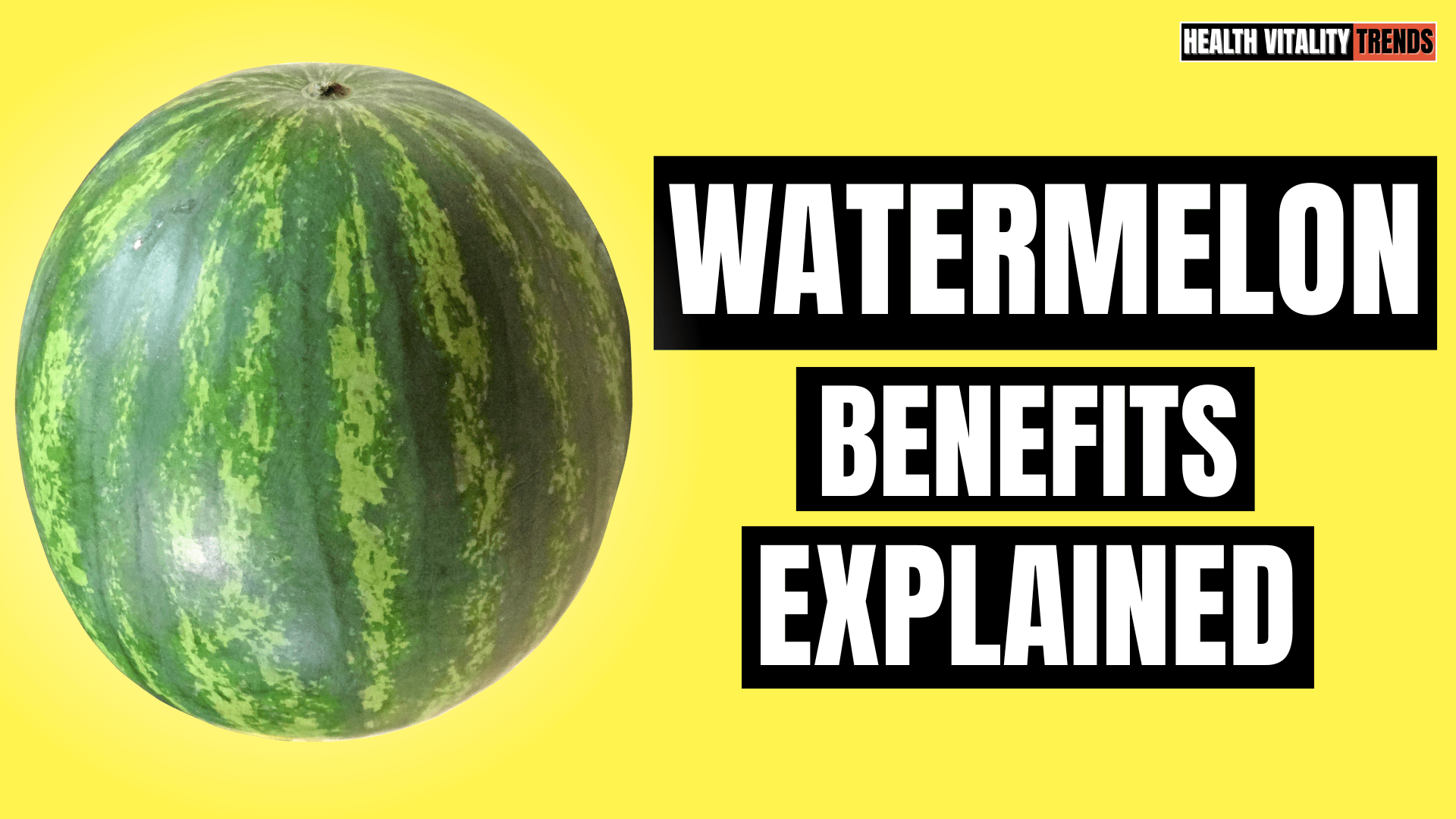
WATERMELON: Hydrating Superfruit That Refreshes & Rehydrates
Watermelon is a refreshing and hydrating fruit that is most popular during hot summer months.
With its high water content, natural sweetness, and rich supply of vitamins, minerals, and antioxidants, watermelon is both delicious as well as nourishing.
From reducing dehydration to supporting heart health, this juicy fruit is more than just a seasonal treat. Let’s explore its nutrition, benefits, and the best ways to enjoy it.
What is Watermelon?
Watermelon (Citrullus lanatus)[1] is a tropical fruit native to Africa, which is now grown and sold worldwide. It belongs to the gourd family (Cucurbitaceae), and is related to cucumbers, pumpkins, and squash.
Watermelons are typically large, green-skinned, and filled with sweet, juicy red or pink flesh. They also come in some seedless varieties, which have a yellow or orange eating portion that offers both taste and visual appeal.

What Does Watermelon Taste Like?
Watermelon has a crisp, juicy, and refreshing taste with natural sweetness. Its high water content makes it light and hydrating, while the texture ranges from crunchy when freshly cut to melt-in-your-mouth and soft when fully ripe.
Some varieties may taste sweeter, while others have a subtle honey or cucumber-like flavor. In many cultures, watermelon is enjoyed not only as a fruit but also in salads, juices, and savory dishes.
Watermelon Nutrition Facts
According to the USDA FoodData Central[2], here’s the nutrition breakdown for one cup of diced watermelon (152 g):
| Nutrient | Amount per 1 cup (152 g) |
|---|---|
| Calories | 46 kcal |
| Carbohydrates | 11.5 g |
| Dietary Fiber | 0.6 g |
| Sugars | 9.4 g |
| Protein | 0.9 g |
| Fat | 0.2 g |
| Vitamin C | 12.5 mg (14% DV) |
| Vitamin A | 865 IU (17% DV) |
| Potassium | 170 mg (5% DV) |
| Magnesium | 15 mg (4% DV) |
| Lycopene | 6,980 mcg (varies by ripeness) |
Explanation: Watermelon is over 90% water, making it an excellent choice of fruit for hydration. Yes, it is low in calories but also rich in vitamin C, vitamin A, and antioxidants like lycopene, which have long-term protective effects against heart disease and certain cancers.
Health Benefits of Watermelon
1. Promotes Hydration
With more than 90% water content, watermelon helps prevent dehydration and keeps the body cool.
2. Supports Heart Health
Lycopene and citrulline in watermelon may improve blood flow and reduce cardiovascular risks. (PubMed)[3]
3. Rich in Antioxidants
Lycopene, vitamin C, and beta-carotene help reduce oxidative stress and fight inflammation.
4. Aids Muscle Recovery
Citrulline, an amino acid in watermelon, may reduce muscle soreness and support athletic performance, especially for bodybuilding athletes. (NIH)[4]
5. Supports Eye Health
Beta-carotene and vitamin A contribute to good vision and eye protection.
6. May Help with Weight Management
Low in calories but high in water, watermelon increases satiety without the need to consume excess calories, which is helpful for people following a fat-loss program.
How to Eat Watermelon
- Fresh: Slice the fruit into cubes and enjoy chilled.
- Juice: Blend into refreshing drinks, often mixed with lime or mint.
- Salads: Pair with feta cheese, cucumber, and mint for a savory-sweet dish.
- Grilled: Thick watermelon slices can be lightly grilled for a smoky flavor.
- Cultural Use: In Japan, watermelons are sometimes shaped into squares for easier storage and gifting.
How to Store Watermelon to Keep It Fresh
- Whole watermelon: Store at room temperature for up to 7–10 days.
- Cut watermelon: Wrap or store in an airtight container in the refrigerator for up to 3–4 days.
- Freezing: Chopped into cubes and freeze for smoothies or homemade popsicles.
- Keep away from direct sunlight to slow ripening.

Possible Side Effects and Precautions
Side Effects
- Digestive Issues – Overeating may cause bloating or diarrhea due to high water and fructose content.
- Blood Sugar Spikes – Although moderate, the natural sugars can spike glucose levels in diabetics.
- Excess Potassium – Consuming large amounts may be harmful for those with kidney disorders.
- Allergic Reactions – Rarely, some people may develop oral allergy syndrome (OAS) from watermelon.
Precautions
- For athletes, pair with protein-rich foods for balanced recovery.
- People with diabetes should consume watermelon in measured portions and consult their nutritionist for the daily intake limit.
- Those with chronic kidney disease should monitor potassium intake.
- Avoid eating watermelon late at night if you are prone to frequent urination.
Fruits Similar to Watermelon
- Cantaloupe – Another hydrating melon with a sweet, musky flavor.
- Honeydew Melon – Mildly sweet and refreshing, rich in vitamin C.
- Cucumber – Hydrating with a crisp texture, similar in water content.
- Papaya – Soft, sweet, and tropical with digestive benefits.
Common FAQs About Watermelon
Q1: Is watermelon good for weight loss?
Yes. Its low-calorie and high water content make it ideal for reducing calorie intake while keeping you full.
Q2: Can diabetics eat watermelon?
Yes, but in moderation, as its natural sugar can still spike blood sugar levels. Always consult your nutritionist to determine how much quantity you are allowed to eat per day.
Q3: Is it okay to eat watermelon at night?
Yes, but excessive intake may cause bloating or disrupt sleep in some people due to increased urination.
Q4: What’s the best way to know if a watermelon is ripe?
Look for a creamy yellow spot on the rind and a hollow sound when tapped; this indicates ripeness.
Conclusion
Watermelon is more than just a summertime refreshment—it’s a nutrient-rich fruit that hydrates, supports your heart and eye health, and provides powerful antioxidants. With its versatility in both sweet and savory dishes, watermelon can be a healthy and delicious addition to your diet. Enjoy it fresh, blended, or grilled for maximum benefits.
References
- https://en.wikipedia.org/wiki/Watermelon
- https://snaped.fns.usda.gov/resources/nutrition-education-materials/seasonal-produce-guide/watermelon
- https://pmc.ncbi.nlm.nih.gov/articles/PMC6574932/
- https://pubmed.ncbi.nlm.nih.gov/23862566/




